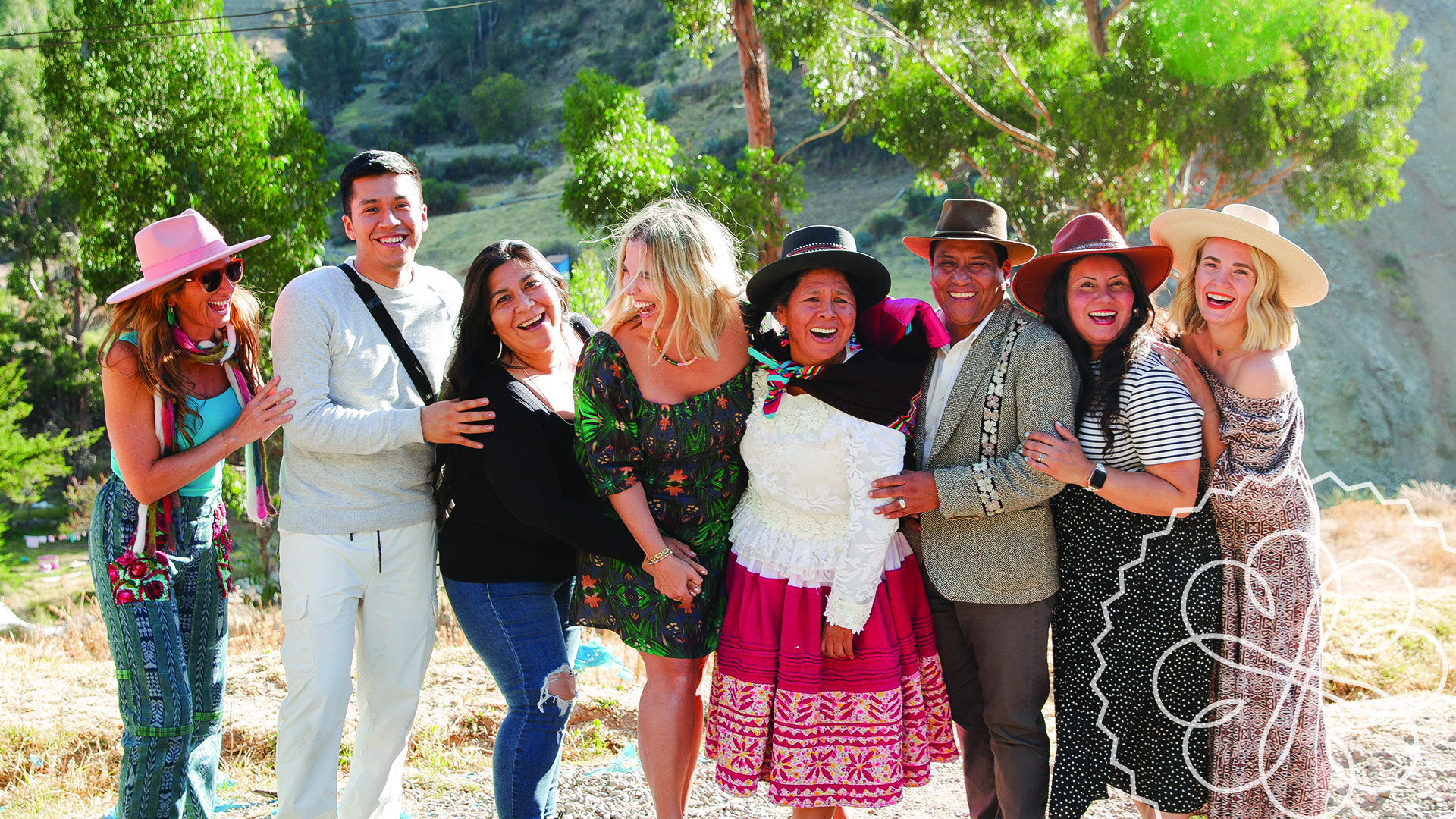
Four Ways To Combat Loneliness In Your Life
Liz Forkin Bohannon, founder of Sseko Designs and the author of Beginner’s Pluck, explains how community building and reflective listening can have a massive impact on removing loneliness from your life.
You can listen to this conversation with Liz on our podcast, Work, Love, Pray! Listen below or click here to find your preferred listening platform.
You have come up with four ways that anyone can combat loneliness. Can you share about the first way: knowing that you are not alone in how you feel?
There is so much shame and so much stigma around being lonely in our culture. 66% of Americans, when asked privately or anonymously, would say that they’re struggling with loneliness. Less than 12% of people are willing to publicly admit it or talk about it. That’s a very big delta that you probably don’t see with a lot of other ailments in society. I mean, somebody who has a broken leg is not afraid to admit that they have a broken leg!
Loneliness is something that people feel will cause them to be perceived as a ‘loser’ if they admit that they are feeling lonely. If someone is feeling lonely, they may believe the unspoken mistruths that they aren’t likable, not lovable, are annoying, or that something is broken or messed up about them.
I think the very first thing that we need to do as a culture is to de-shame loneliness and say, ‘Listen—if you’re feeling lonely, congratulations. You’re pretty average!’ One of the concepts that I talk about in my book, Beginner’s Pluck, is this idea of owning your average. A lot of people are a little bit demoralized when they hear that they’re average, often saying, ‘Wait, what? I grew up hearing that I was extraordinary and I’ve been trying to prove that my entire life, and you’re just telling me I’m average?’ Statistically speaking, that’s how averages work. Most of us are somewhere in the center of the bell curve when it comes to giftedness, inherent talents, and intelligence. You are also pretty average when it comes to the things that plague you, like your insecurities and your weaknesses.
We have a tendency to think we’re these special snowflakes, which can lead to us telling ourselves that no one struggles like you do with something. That line of thinking actually leads to an immense amount of suffering. There is a difference between pain and suffering. Pain is an intrinsic part of being a human. You cannot live life without pain. In fact, I would say pain is not only an inherent part of the human experience, it’s actually a really necessary and beautiful part of the human experience.
Suffering is the narrative and the story that we attach to our pain. I do believe that we can decrease suffering, and I actually think community is a huge part of that. For example, you fall down the stairs and break your leg, that’s very painful. Suffering is when, three days later, you’re laying in bed and you think, ‘Man, I have this broken leg and I am such a burden to everybody around me, and I’m starting to feel depressed and anxious because I can’t contribute. How much longer is someone going to take care of me if I can’t give them something back?’ That’s what suffering sounds like. There’s a degree to which we choose to participate in that narrative of suffering. We can either engage it and indulge it, or we can be really active participants in trying to reframe and rewire that narrative to lessen our own suffering.
I believe that the pain of loneliness is real. That’s a psychological state that can be measured. Our bodies respond to the psychological pain of loneliness just as intensely as we would respond to the physical pain of getting punched in the stomach. If you had a brain scan done as you’re scrolling Instagram and feeling left out, your brain would register the same on a scan as it would if someone walked into your bedroom and socked you in the stomach.
One of the ways in which we can de-shame loneliness is to stop thinking and talking about it as an individual problem and instead, start talking about it like a collective cultural problem. One of the things that I love to say is, ‘Loneliness isn’t just a you issue. Loneliness is actually an US issue.’ We have designed a culture that is perfectly set up to get the results of loneliness that it’s getting. In order to change the outcome, we have to change the design of culture. And that’s an us thing. When we start thinking about loneliness collectively, a lot of that shame and additional suffering that we feel around loneliness starts to decrease.
The next two ways that someone can combat loneliness have one major shared ingredient we’ve already talked about a little bit, and that’s community. How can someone use community to overcome loneliness in their life?
I think that community and authentic, committed relationships are the antidote to loneliness. There is no way to solve the pain of loneliness except to change the circumstances and create and build relationships. We also have to go from striving to find community and recognize that it’s not something you find—it’s something you build.
I feel like one of the drums that I really beat for five years was around purpose and passion. I really dove into the semantics of purpose and the thought that if you find your purpose and the reason that God created you, everything’s going to fall into place. I hate the word ‘find,’ because it automatically puts you in a place where you’ve got weird expectations that will never be lived up to.
How do you build things? You take steps, you have plan or a blueprint, and then you focus on gathering materials and putting in the work to build what you’ve imagined. Building doesn’t happen magically overnight. There will be progress, and it will be slow and steady, and there will be setbacks. But one day, it’ll be done.
In all of my years of thinking about community building and friendship, I have never once met someone who said that they were super lonely and then showed up to something and magically found their people. I just don’t think it works like that, because the whole nature of relationship is that it’s a building block. The only thing that makes friendship rich 15 steps down the line is that you took those 15 steps to get there—together. If you want community, it’s on you to build it.
How does the power of reflective listening help fight off loneliness?
If you want to build community and have deep friendships that are reliable and marked by authenticity and integrity, you’re going to need to learn how to listen. Learning how to effectively deal with conflict is a key ingredient to having meaningful, authentic, committed community. One of my earliest experiments in community building was in college. I lived with a group of six women, and one of the things we did that I think fundamentally changed the fabric of our relationship was have a roommate meeting every Monday night at 10:00 PM. We picked that time because we knew there wouldn’t be any other conflicts. We made this meeting a non-negotiable. It wasn’t something that you came to when you felt like it, when you had the energy for it, when you happened to be around.
One of the core aspects of this roommate meeting was that it is a time for us to talk about anything that needed to be talked about. We were six women sharing one house—conflict was going to emerge. We created a ‘container’ where the expectation was you come and have something to share and something to say. The hope was that a relatively small thing didn’t become a bigger thing, because we had created an appropriate and designated container to have that time.
If you know that you have a space is dedicated to conflict resolution, it’s incredible to watch all of the negative feelings that typically surround conflict just…go away. It kind of comes back to the pain and the suffering we talked about earlier. You’re removing the suffering through honest communication that takes the drama potential out of a situation. Because of those roommate meetings and the intentionality behind them, those five women are still my ride-or-die. These are women that I will literally go to the grave in relationship with, holding some of my deepest, most tender stories. The level of support that these women have been for me over the last 20 years is so significant. But I deeply believe it’s because of just a few key practices that we put into place early on in our relationship that actually enabled the longevity and health of our community.

Liz Forkin Bohannon is the founder of Sseko Designs and the author of the book Beginner’s Pluck: Build your life of purpose, passion and impact now.
Liz graduated from the University of Missouri with a Master’s degree in Journalism. In 2008, she moved to Uganda where she met an incredible group of talented young women who were struggling to finance their higher education.
After traveling the country by motorcycle to find raw materials and learn how to produce footwear by hand, Liz hired three young women and started Sseko Designs. Since then, Sseko Designs has grown from three women making sandals together under a mango tree, to an international fashion brand that provides employment, educational opportunities, and entrepreneurial training to hundreds of women in East Africa and across the globe.
Using her unlikely story of a journalist-gone-shoe-maker, Liz shares her passion for social entrepreneurship, risk & failure, purpose and the power of community. Recently, Sseko Designs merged with Noonday Collection to become the world’s leading socially-conscious fashion brand, powered by social selling.
Liz has been featured in dozens of publications including Good Morning America, ABC’s Shark Tank, Vogue Magazine, Redbook Magazine, O Magazine, Inc, Fortune and others. Among other notable honors, Liz was recently named a top three Transformation Leader by John Maxwell and Bloomberg Businessweek named Sseko as a top social enterprise. Forbes named Liz one of the top 20 public speakers in the U.S. Liz’s powerful, disarmingly authentic, and witty voice captivates and inspires her audience.
She now lives in an intentional community in Portland, Oregon, with her husband Ben and their three young sons.